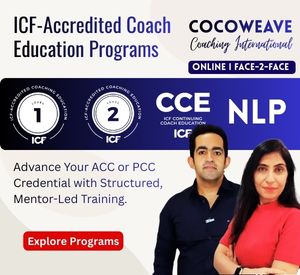As a professional coach, you very well may be the spokesperson and face of your own coaching business. As such, taking advantage of opportunities to share your expertise with the media can help you grow your reputation, attract new clients, and help raise awareness about the power of coaching. It may sound intimidating, but speaking to reporters or journalists doesn’t have to be something to be anxious about. Whether you wish to seek out opportunities to share your coaching perspective or a reporter has approached you for comment, your coaching expertise is valuable to the media and their audiences.
So, if you have been approached by a journalist or asked for an interview, don’t panic! Here are a few tips to help you to represent your coaching business well.
How to Field a Request from a Reporter
If a reporter contacts you unexpectedly, don’t feel pressured to take their questions in the moment, even if they say they’re up against a tight deadline. Anything you say to a reporter might end up in print or broadcast, so it’s well worth the time and effort to prepare before speaking.
Instead, take these three steps:
- Express your desire to help, but that you cannot speak right then.
- Ask what the story is about, and what questions the reporter has.
- Ask what the reporter’s deadline is.
Use this information to prepare and get back to the reporter when you feel ready (with respect to their deadline).
Understand Your Audience
Prior to a media interview, research the journalist to understand their previous coverage, reporting style, audience, and any prior knowledge or biases about coaching they may have. These days, most outlets include profile pages for their staff reporters and contributors on their websites.
As you review, consider: Does this reporter have a demonstrated understanding of coaching? Should you be prepared to offer a definition of coaching, and how it differs from mentoring or other practices? Are there resources or foundational information the reporter or the outlet’s audience might benefit from? You may need to tailor your key messages to their current level of familiarity with coaching.
It may also be important to note if the reporter or outlet has any prior coverage of coaching, and if so, what bias they have about the profession. If prior coverage has expressed concerns around uncredentialled coaching, for example, you will want to be prepared to address this in the interview. In addition to the reporter’s recent coverage history, you can also perform a keyword search on the outlet’s website to learn about any past coverage of coaching.
Determine Your Key Messages
When preparing for an interview, start by considering: If the audience only remembers one thing from this story, what do you want that one thing to be? This will inform your key messages.
Key messages are the main points you want to focus on throughout the interview. It is best to stick to a maximum of three takeaways, along with a few examples or data points to support them. This focus on a distilled set of points will allow you to provide depth on these key messages throughout the conversation — as well as make it easier for the reporter to remember them!
When defining your key messages, ask yourself:
- What does a coaching perspective have to offer on the reporter’s topic?
- How can a coaching approach help people to navigate this topic? How might coaching add value to a person navigating the topic?
- How do ICF best practices, credentialing, and ethics of the profession factor into this topic?
Depending on the topic, you may also wish to be prepared to speak to your coaching specialization and/or credentials, and what sets your coaching practice apart from others.
Write out your thoughts in response to these questions and consider what messages are most important to share. Take the time to think about how to best articulate and support these points with the reporter in a way that will be easy for the outlet’s audience to understand, even with limited or no background on the topic.
Practice, Practice, Practice!
In order to feel confident and prepared in front of the media, practice answering potential questions from the reporter — even the pros do it!
When practicing, consider how the interview may go, and work with a colleague or friend if you can. Consider any follow-up questions the reporter might ask. What challenges to your perspective might they raise? What concepts about coaching or your area of expertise might they need more background on?
Practice answering questions the reporter may ask you, so you are ready for almost anything.
You Are the Best Spokesperson for Your Coaching Practice
Now, it’s showtime! With your careful preparation, you are sure to come across as confident, knowledgeable, and polished. Remember, you are always on the record, so try to avoid mentioning anything you wouldn’t want to be quoted on.
When interacting with the media, relax and focus on your key messages. Your ICF coaching experience and expertise is valuable and deserves to be shared. With these tips, you will be well-prepared to increase coaching awareness and help others.
For more helpful tips about public relations for coaches, see the ICF PR Toolkit.
Disclaimer
The views and opinions expressed in guest posts featured on this blog are those of the author and do not necessarily reflect the opinions and views of the International Coach Federation (ICF). The publication of a guest post on the ICF Blog does not equate to an ICF endorsement or guarantee of the products or services provided by the author.
Additionally, for the purpose of full disclosure and as a disclaimer of liability, this content was possibly generated using the assistance of an AI program. Its contents, either in whole or in part, have been reviewed and revised by a human. Nevertheless, the reader/user is responsible for verifying the information presented and should not rely upon this article or post as providing any specific professional advice or counsel. Its contents are provided “as is,” and ICF makes no representations or warranties as to its accuracy or completeness and to the fullest extent permitted by applicable law specifically disclaims any and all liability for any damages or injuries resulting from use of or reliance thereupon.
Authors
Post Type
Blog
Audience Type
Experienced Coaches, External Coaches, ICF Chapter Leaders, Internal Coaches, Mentor Coaches, New Coaches, Professional Coaches, Team and Group Coaches
Topic
Building a Successful Coaching Business, Business Development
Related Posts
How to Use LinkedIn to Establish Thought Leadership
LinkedIn offers coaches a powerful opportunity to attract new clients, establish thought leadership, and grow…
Personal Branding for Coaching — Amplified by AI
How can you stand out as a coach in a crowded market…
The Executive Coaching Blueprint: Positioning, Pricing, and Performance
Transitioning from corporate to coach can feel like uncharted territory for many…







